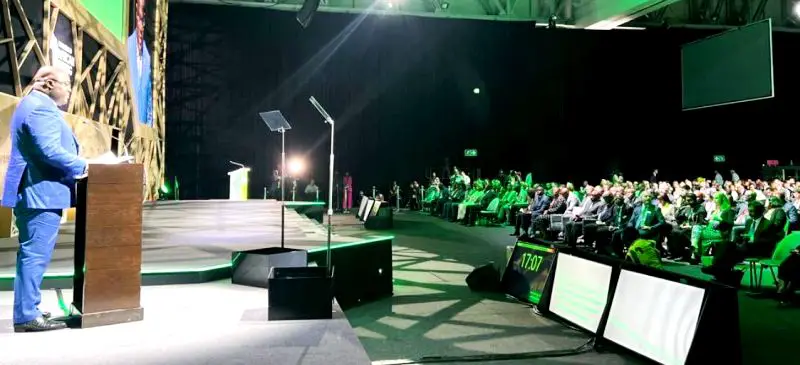President Felix Tshisekedi of the Democratic Republic of Congo has again blamed Rwanda for the insecurity situation in Eastern part of the country.
Tshisekedi is attending the African Mining Indaba conference in Cape Town, South Africa which kicked off yesterday.
The conference discussions are being held under the theme; ‘Unlocking African Mining Investment: Stability, Security, and Supply’.
The Congolese leader has as expected used the Mining Indaba platform to denounce M23 rebels that currently control a large part of North Kivu. He also accused Rwanda of aiding the rebels
“M23 rebels/Rwanda claim that they’re fighting for rights of Tutsi but instead they’re stirring ethnic divisions, so that they can get something to accuse Congo and justify their reason of invading RDC,” says Tshisekedi.
He told particpants at the conference, “My country, DRC, is ready to put in place mutually beneficial agreements with all partners who need our resources,” he said.
President Cyril Ramaphosa of South Africa has delivered a key note address at the ongoing Investing in African Mining Indaba conference in Cape Town. His address is aimed at driving investments in Africa.
Mining Indaba is the world’s largest mining investment conference, dedicated to the capitalization and development of mining in Africa.
Ramaphosa has moved to assure investors that government is addressing the challenges facing the country to ensure that South Africa reaches its full mining potential
Miners in South Africa are under pressure to find alternatives from investors anxious to meet goals on reducing carbon emissions and because Eskom’s coal-fired power plants often break down.
Harmony Gold (HARJ.J), South Africa’s biggest gold miner said on Monday that it is exploring options, including hydrogen and natural gas, to cut its dependence on state utility Eskom.
Major industries have been assessing hydrogen as a way of reducing emissions, but it is only carbon-neutral if it is produced using renewable energy.
Meanwhile, Tom Palmer CEO of Newmont Participated in a panel on the issue at the Investing in African Mining Indaba, said he “sat here frustrated in 2023 that we haven’t made the changes we should have made over that period of time”.
“I’m part of that problem.
“People whose behaviour needs to change are those with power and privilege and they look a lot like me in our industry – middle-aged white men.
“When we think about this problem and we think about creating change, we need to have a very honest and robust understanding of the culture within our industry, within each of our organisations. It is very easy to gloss over the top and say we don’t have a problem here,” noted Palmer.
“You need to actually scratch the surface and genuinely listen to understand the culture within your organisation and, I’m sorry to say, that across our 12 managed operations in eight countries around the world, we on a regular basis have cases and incidences of sexual violence, sexual harassment and racism.”
Palmer said it was necessary to understand why this happening, what behaviour had to change, and what systems had to be put in place to improve the situation.
“That is really, really hard work. Complex work. And if you raced through it too quickly, thinking you have the answers, you won’t get a change in behaviour.
“You need to take the time to sit down and talk to people in the minority. To understand their stories and then determine a course of action.
“That is what we are doing in our organisation.”




















